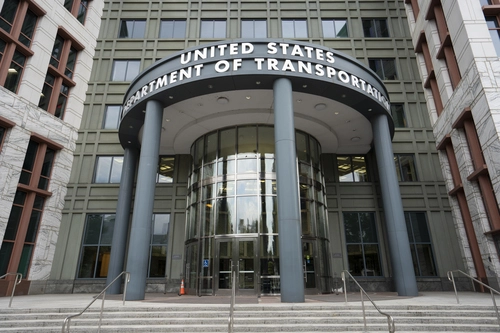
December 12, 2025 Update | (U.S. DOT Updates FAQs on the DBE Program Interim Final Rule and new Affirmative Action Challenge in Lawsuit Filed in Louisiana Federal Court)
New Interim Final Rule Frequently Asked Questions
On December 1, 2025, the United States Department of Transportation (U.S. DOT) published an updated frequently asked questions (FAQs) on the October 3, 2025 Interim Final Rule (IFR) for the Disadvantaged Business Enterprise (DBE) program, which eliminates the race- and gender-based presumption of disadvantage for businesses applying for DBE certification. The updated FAQs included responses to new queries on the following topics: (1) General; (2) Contracting Questions; (3) Certification Reevaluation; (4) New Certification Applications; and (5) Transit Vehicle Manufacturers. Some of the highlights of the updated FAQs are below.
General
The U.S. DOT clarifies that recipients can implement their own race- and sex-neutral small business enterprise programs on federally assisted contracts, pointing out that, in fact, the current DBE regulations require recipients to include an element in their DBE programs to facilitate competition by small business concerns. This requirement can be met by establishing a DBE-neutral small business set-aside program, under which eligibility cannot be based in whole or in part on race or sex.
Further, as discussed in our October 29 blog post, U.S. DOT has further addressed appropriate action required to be taken if a DBE performing work on a contract is not recertified during the reevaluation process. Under U.S. DOT’s October 24 round of FAQs, it is directed that recipients will be required to take appropriate action to discontinue the effect of unconstitutional certification and, if a recipient does not take appropriate action with respect to a contract, the U.S. DOT will not make any payments with respect to that contract (question B.1.). Under the December 1 FAQs, U.S. DOT has indicated that “appropriate action to discontinue the effect of unconstitutional certification” will depend on individual circumstances, but that the recipient must take all measure to ameliorate prior unconstitutional actions.
Contracting Questions
Recipients should note that the U.S. DOT has indicated that during the reevaluation period, a prime contractor that terminates a DBE or a portion of a DBE’s work in compliance with 49 CFR § 26.53(f) is not required to attempt to include additional DBE participation under its contract.
Certification Reevaluation
The U.S. DOT clarifies that the owner of a firm seeking DBE certification is not required to meet all categories of economic hardship, systemic barriers, and denied opportunities to establish social disadvantage through the personal narrative. The personal narrative must take a holistic approach to establish the existence of disadvantage by a preponderance of evidence (e.g., education, employment, business history). Further, the U.S. DOT clarifies that the personal narrative need not span the full scope of the owner’s life experiences related to economic disadvantage. Rather, the personal narrative can discuss incidents and experiences of economic hardship, systemic barriers, and denied opportunities from any point in the owner’s life within American society.
New Certification Applications
The updated FAQs clarify the IFR does not affect firms recently denied certification. A firm must abide by the requisite waiting period before reapplying for certification in accordance with the revised certification standards established by the IFR.
Transit Vehicle Manufacturers
The U.S. DOT clarifies that ferry acquisitions, like other transit vehicle manufacturers, are subject to the IFR inasmuch as the recipient establishes a project-specific DBE goal for the vehicle procurement. In that instance, the recipient must set a goal of zero until the recipient’s Unified Certification Program completes the required reevaluations.
New Legal Challenge to Race-Based Rebuttable Presumption in Federal Program
Relatedly, another affirmative action program has been recently challenged based on alleged violations of the Equal Protection Clause. On November 17, 2025, Revier Technologies, Inc., a Louisiana-based technology company, and Young America’s Foundation, a nonprofit youth outreach organization, filed a lawsuit, Revier Technologies, Inc., et al. v. U.S. Small Business Administration, et al., No. 2:25-cv-02328, in the U.S. District Court for the Eastern District of Louisiana. The plaintiffs are seeking to invalidate the Small Business Administration (SBA) regulation that establishes a rebuttable presumption of “social disadvantage” for members of designated racial and ethnic groups. The plaintiffs specifically challenge two programs: (1) State Small Business Credit Initiative, which offers small business investment capital, and (2) Intelligence and Cybersecurity Diversity Fellowship, administered by the U.S. Department of Homeland Security. Similar to the Mid- America1 lawsuit, the Revier lawsuit directly challenges the use of a “rebuttable presumption” which serves as a foundation for many federal affirmative action programs. The resolution of the lawsuit may expand upon prior constitutional rulings against race-based presumptions that have been accumulating over the last few years since the U.S. Supreme Court’s 2023 decision in Students for Fair Admissions,2 including the Ultima3 decision which enjoined the SBA from using the rebuttable presumption that certain racial/ethnic groups are socially disadvantaged in its 8(a) program.
1 Mid-America Milling Co., LLC v. U.S. Dep't of Transp., case no. 3:23-cv-00072 (E.D. Ky.).
2 Students for Fair Admissions, Inc. v. President & Fellows of Harvard College, 600 U.S. 181 (2023).
3 Ultima Services Corp. v. U.S. Dep’t of Agriculture, case no. 2:20-cv-00041 (ED Tenn.).
October 29, 2025 Update (U.S. DOT Publishes FAQs on Interim Final Rule for DBE Program)
On October 24, 2025, the United States Department of Transportation (U.S. DOT) published frequently asked questions (FAQs) on the October 3, 2025 Interim Final Rule (IFR) for the Disadvantaged Business Enterprise (DBE) program, which eliminates the race- and gender-based presumption of disadvantage.
The FAQs provide clarification on the following notable topics:
- Amendments to DBE Program Plans. Recipients are expected to amend their DBE plans as soon as practicable after the Unified Certification Program (UCP) in their jurisdiction completes the reevaluation process described in 49 C.F.R. § 26.111 to reflect the changes in the IFR. Notably, the UCP reevaluation and recertification of DBEs must be completed prior to a recipient updating its DBE plan.
- No Grandfathering of Existing Contracts or Procurements that are in Progress.
- Pending Advertisements. Recipients with DBE goals on contracts that have been advertised must issue amendments to the advertisements removing the DBE contract goals.
- Pending Contracts. For projects with DBE contract goals that have completed procurement but have not yet been awarded (i.e., with an executed contract), recipients must take appropriate action to zero out the DBE goals. Recipients can amend the contracts without readvertising as allowed under relevant state law.
- Contracts Executed Prior to October 3, 2025. Contracts with DBE goals are not required to be modified, but DBE participation on such contracts cannot be counted toward the DBE contract goal or toward the recipient’s overall DBE goals until the UCP in the recipient’s jurisdiction completes the reevaluation process described in 49 C.F.R. § 26.111. If, after the reevaluation process is complete, every DBE performing work on a contract is recertified under the new standards, then the contract will not need to be modified. In contrast, if a DBE performing work on a contract is not recertified during the reevaluation process, the recipient will be required to take appropriate action to discontinue the effect of the unconstitutional certification; if a recipient does not take appropriate action with respect to a contract, the U.S. DOT will not make any payments with respect to that contract. While the direction to take appropriate action to discontinue the effect of the unconstitutional certification does not explicitly identify what actions are would be required by the recipient in the event a DBE performing work on a contract is not recertified, U.S. DOT could provide further clarity on this matter through another round of FAQs or through the issuance of a final rule after receipt and consideration of comments submitted on the IFR.
- Goal Setting and Counting. Recipients are not required to do anything with their DBE goals until their respective UCPs have completed the reevaluation process described in 49 C.F.R. § 26.111. Until the UCP completes the reevaluation process, a recipient is not required to update its DBE goal (§ 26.45(h)) and may not count any DBE participation toward its goal (§ 26.55(i)).
- Personal Narrative Statement. The FAQs do not provide additional clarity or guidance around the subjective nature of the narrative establishing the existence of the DBE applicant’s disadvantage. The U.S. DOT advised that it expects to provide an updated Uniform Application Form on its website.
- Airport Concession Disadvantage Business Enterprise. The U.S. DOT clarified that IFR applies to the Airport Concession Disadvantaged Business Enterprise (ACDBE) Program as the IFR also made changes to the ACDBE regulations in 49 C.F.R. Part 23.
The notice and comment period on the IFR is still open. The deadline for submitting comments on the IFR to the U.S. DOT is November 3, 2025.
October 3, 2025 (U.S. DOT Issues Interim Final Rule for DBE Program)
Today, the United States Department of Transportation (U.S. DOT) issued an Interim Final Rule (IFR) entitled “Disadvantaged Business Enterprise Program and Disadvantaged Business Enterprise in Airports Concessions Program Implementation Modifications,” updating the requirements for its Disadvantaged Business Enterprise (DBE) Program as set forth in 49 C.F.R. Part 26. In addition, today the U.S. DOT’s Office of Civil Rights issued guidance regarding the IFR.
The impetus for the changes to the U.S. DOT’s DBE Program are many, including the following:
- The progression of the Mid-America Milling Co., LLC, et al., v. U.S. Department of Transportation, et. al.1 lawsuit (“Mid-America”);
- The issuance on January 20, 2025, of Executive Order 14151 (“Ending Radical and Wasteful Government DEI Programs and Preferencing”), issuance on January 21, 2025, of Executive Order 14173 (“Ending Illegal Discrimination and Restoring Merit-Based Opportunity”), and issuance on February 19, 2025, of Executive Order 14219 (“Ensuring Lawful Governance and Implementing the President’s ‘Department of Government Efficiency’ Deregulatory Initiative”); and
- Secretary Duffy’s issuance of an order (DOT Order 2100.7, “Ensuring Reliance Upon Sound Economic Analysis in Department of Transportation Policies, Programs, and Activities”) and memorandum (“Implementation of Executive Orders Addressing Energy, Climate Change, Diversity, and Gender”) on January 29, 2025.
In implementing the foregoing, the United States Attorney General issued on March 21, 2025, a memorandum to all federal agencies (“Implementation of Executive Orders 14151 and 14173: Eliminating Unlawful DEI Programs in Federal Operations”) and the President issued on April 9, 2025, a memorandum to the heads of executive departments and agencies (“Directing the Repeal of Unlawful Regulations”).
Relevantly, the IFR implements the following major changes to the DBE Program:
- Elimination of the “rebuttable presumption” that women, Black Americans, Hispanic Americans, Native Americans, Asian Pacific Americans, and Subcontinent Asian Americans are socially and economically disadvantaged.
- Elimination of the terms “race-neutral” and “race-conscious” and replacing them with “DBE-neutral” and “DBE-conscious.”
- Redefinition of social and economic disadvantage as “any individual who is a citizen (or lawfully admitted permanent resident) of the United States and who a certifier finds to be socially and economically disadvantaged on a case-by-case basis.”
- Re-evaluation of all currently certified DBEs under Unified Certification Programs (UCP) that are refocused to the new definition of social and economic disadvantage and new process set forth in the IFR.
- Resetting of an agency’s overall DBE goal based on the refocused UCP and determination of whether an agency can meet its overall goal using solely DBE-neutral means, or if the agency must use DBE-conscious contract goals on DOT-assisted contracts to meet its overall goal.
To demonstrate social and economic disadvantage under the IFR, an applicant for DBE certification is now required to submit a personal narrative including the following information:
- A narrative establishing the existence of the DBE applicant’s disadvantage by a preponderance of the evidence based on individualized proof regarding specific instances of economic hardship, systemic barriers, and denied opportunities that impeded the applicant’s progress or success in education, employment, or business, including obtaining financing on terms available to similarly situated, non-disadvantaged individuals.
- A statement of how and to what extent the impediments caused the DBE applicant economic harm, including a full description of type and magnitude, and establishing that the applicant is in fact economically disadvantaged relative to similarly situated non-disadvantaged individuals.
- A current personal net worth (PNW) statement and any other financial information the DBE applicant considers relevant.
The IFR does not provide additional clarity or guidance around the subjective nature of the narrative establishing the existence of the DBE applicant’s disadvantage and, while this provides some latitude for an agency to make a determination regarding what evidence is required to demonstrate social and economic disadvantage, agencies should remain mindful that these determinations must be made in the context of the DBE applicant’s “own experiences and circumstances within American society, and without regard to race or sex.”
Notably, the IFR does not change the requirement that a socially and economically disadvantaged individual must own at least 51% interest in a firm and control management and daily business operations to qualify as a DBE. In addition, the objective measure of economic disadvantage will continue to be measured by the firm owners’ PNW, which cannot exceed $2.047 million.
Until a UCP refocuses its certification program and completes re-evaluation of DBE applicants, no agency covered by that UCP will be subject to the compliance provisions of 49 C.F.R. § 26.47, nor will that agency be required to update its overall goal. Similarly, an agency may not include DBE contract goals or count any participation toward overall DBE goals until the UCP completes its re-evaluation process.
Finally, Mid-America remains outstanding. As a reminder, on September 23, 2024, the United States District Court for the Eastern District of Kentucky (the “Court”) issued an Opinion and Order2 granting a preliminary injunction on the basis that the race- and gender-based rebuttable presumptions used in the U.S. DOT DBE Program violate the United States Constitution’s guarantee of equal protection under the Fourteenth Amendment. The Court limits the scope of the preliminary injunction to the plaintiffs, Mid-America Milling Co., LLC, and Bagshaw Trucking Inc. (together, the “Plaintiffs”), in the states in which they are bidding on work.
Currently before the Court is a proposed consent order, jointly filed by the parties on May 28, 2025. The Plaintiffs and the U. S. DOT request that the Court declare that the U. S. DOT’s DBE Program’s use of race- and gender-based presumptions is unconstitutional and enter a permanent injunction. If the Court approves the consent order, the outcome would be that the DBE Program would have to eliminate the use of the rebuttable presumption of social and economic disadvantage.
On June 5, 2025, the Court granted a joint motion to stay filed by the Plaintiffs and the U.S. DOT. The Court is taking the proposed consent order under advisement during the stay, and extended all pending deadlines by 90 days. Following the 90-day stay period, the Court will consider a motion to return the case to the active docket. As of October 2, 2025, the Court has not rendered a decision on the proposed consent order; however, the IFR is substantially in line with the consent order.
The IFR is effective as of October 3, 2025. There is no apparent grandfathering of existing contracts or procurements-in-progress. Any comments on the IFR are due to the U.S. DOT by November 3, 2025.
------
1 Mid-America Milling Co., LLC, et al., v. U.S. Department of Transportation, et. al., No. 3:23-CV-00072-GFVT (E.D. Ky. Sept. 23, 2024).
2 Ibid.
- Partner
Ann-Therese Schmid has advised public agencies on traditional and alternative project development and delivery for more than 20 years. She offers deep background with federal regulatory compliance and is a recognized leader in ...
- Associate
Adeyemi Ojudun focuses on P3 and alternative delivery projects and includes counseling clients on procurement structure, contract drafting and proposer instructions. She has worked with Los Angeles County Metropolitan ...
Nossaman’s 30-plus infrastructure attorneys offer clients, colleagues, strategic partners and industry media a wealth of practical experience, insider insight and thoughtful analysis here on Infra Insight. We blog about what we know best, from industry-leading procurements to local and national policy developments that affect the market and our clients.
Stay Connected
 RSS Feed
RSS Feed
Categories
- Airports
- Alternative Project Delivery
- Bridges
- California Environmental Quality Act
- Cybersecurity
- Design-Build
- Financing
- High-Speed Rail
- Job Opening
- Legislation
- News
- P3s
- Policy
- Ports
- Rail and Transit
- Social Infrastructure
- Tollroads/ Turnpikes/ Managed Lanes
- Transportation Infrastructure
- Tunnels
- Water


